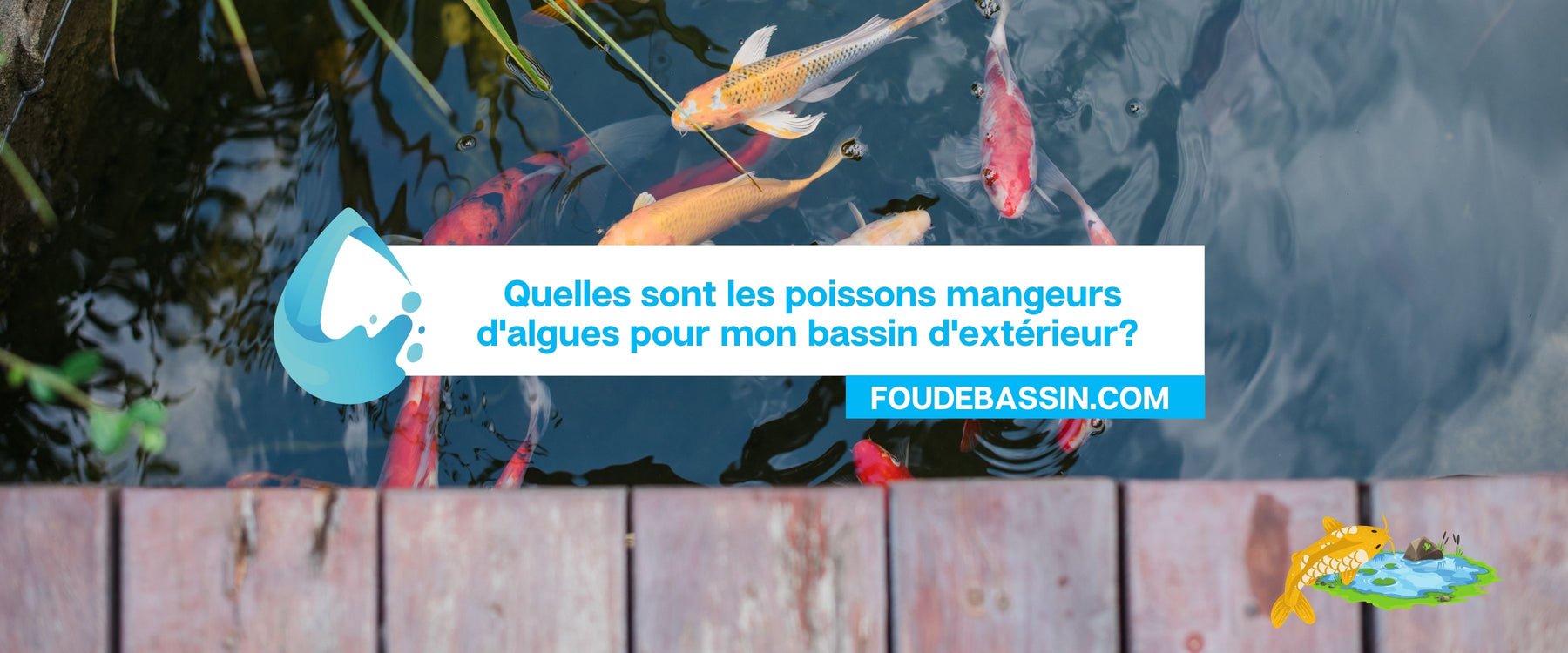Retrouvez ici les indispensables et meilleures ventes pour nos propriétaires de bassin.
Retrouvez ici les indispensables et meilleures ventes pour nos propriétaires de bassin.

Are you looking for algae-eating fish for your outdoor pond? What are algae-eating fish for my outdoor pond?

Not all fish are algae eaters: some are carnivores and some just don't like algae. Today, we're going to focus on the best species of algae-eating fish! Thus, you will know which species to select to do a great cleaning in your outdoor pond.
The famous koi carp is a magnificent aquatic species that can live for centuries and exceed the meter. Straight from Japan, koi carp loves algae. But what she loves above all is making friends with humans. So, in addition to cleaning your outdoor pond, koi carp make excellent pets.
These fish need a lot of space to move around, as they measure 80 cm on average for a weight ranging from 5 to 8 kg. That said, you can breed these species very well. Most of the time, koi carp get along well with other fish, although they can become aggressive during the breeding season.
The Ancistrus is a tropical freshwater fish native to South America. It comes in many colors and has a reputation for being a tile cleaner. And for good reason: we often see them stuck on roots, rocks and glass in an aquarium. That said, this fish likes the dark more than the light. It will be mainly active at night.
It is therefore an excellent choice if you are looking for algae-eating fish for your outdoor pond. In addition, these small tropical fish can cohabit with Tetras and Amazonian cichlids. On the other hand, there may be friction with Corydoras and shrimps.
The black-striped barbel loves algae so much that it is nicknamed “the algae eater”! This fish native to the ponds of Asia is best suited to large ponds since it can reach a size of more than 15 centimeters. Its suction cup mouth clings to rocks, plants and the walls of ponds to clean it. In addition, it is particularly effective in sucking up black algae.
Important: These fish can be aggressive, so check their compatibility with other fish before placing them together.
Grass carp or grass carp are real gluttons when it comes to eating algae. Of course, it is also huge (50 to 90 cm on average). Thus, it can only be accommodated in large ponds of several hundred liters.
Grass carp eat between 40 and 300% of their weight in vegetation every day. She loves pond grass, but she also gobbles up any algae lying around. So, if you have a large pond, these will be the perfect algae-eating fish.
Channel catfish are the most common catfish in North America. It too is reserved for large ponds or outdoor pools. And just like grass carp, the channel catfish is a species that leaves virtually nothing in its path. Moreover, this space has a very developed sense of smell which helps it to find algae.
The pond loach is an algae eater that has the specificity of being able to breathe and move out of water. This fish gets along very well with other species such as koi and mosquito fish. That said, pond loaches tend to be a bit shy. They don't swim to be seen.
Good to know: this fish can reach more than thirty centimeters in length as an adult.
Another brown algae eater is the Molly fish. These popular aquarium pets are hardy and also thrive outdoors in ponds. This is a species that works well with other algae-eating fish. Be careful though, the Molly needs enough space to feel good. Opt for a tank of at least 200 liters if you want to accommodate this type of fish.
This atypical fish is renowned for its long, slender body and pointed nose. It usually reaches a maximum adult height of around 16 centimeters. This species likes a minimum volume of 240 liters and needs water with a stable balance.
Although they love to devour the algae present on the roots, plants, substrates or windows, but it can quickly change location if the danger arises.

Are you interested in one of these 8 species of fish? So find out about the behavior, size, needs and mode of reproduction of the species. It is important not to make this choice lightly, as most algae-eating fish have very long life expectancies.
Need more advice on maintaining your outdoor pond? Find out quickly how to prevent your water trough from freezing.
Aquipond Greenstab - Natural treatment against pond algae It is a natural product that helps limit algae at any time. It also has a prevent...
View full detailsReduces the layer of silt in the pond by at least 40% Easy to use with less impact on biodiversity Prevents fermentation, bad odors. pH ...
View full detailsOrganic dye to block plant growth by limiting photosynthesis ORGANIC PRODUCT NON TOXIC TO HUMANS (DIVING) AND FISH. 100% NATURAL AND BIODE...
View full detailsThe positive effects of barley straw have been known to water enthusiasts for a long time. But currently barley straw is difficult to find and i...
View full detailsReduces at least 40% of the layer of silt in the pond Easy to use with less impact on biodiversity Prevents fermentation, bad odors. ...
View full details
Comments
Leave a comment